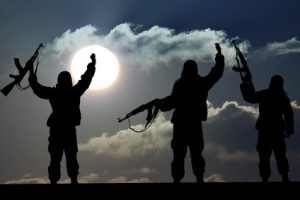A friend of mine belongs to a dinner club. You know the kind: there are maybe 8-10 members, and they take turns hosting a fancy, home-cooked dinner. My friend travels often, and she’s recently gotten frustrated because the decision making–on who’s hosting when, on what the rules are–always seem to be made without her. (She returns messages quickly so her dinner club friends could easily consult her, she argues, but this doesn’t happen.) She was particularly annoyed when the December dinner included a “secret Santa” exchange in which the expected gift expenditure was, in her opinion, way too high. She enjoys the social aspect of her dinner club (and who doesn’t love a good meal?!), but she feels like kind of an outsider to it, so she’s thinking of withdrawing and doing her socializing (and dining and gift giving) elsewhere.

It’s not all that different with armed rebel groups. It is well established that armed groups that are excluded from peace negotiations are far more likely to be “spoilers”–to continue fighting undeterred or even escalating their military activity while the negotiating parties go about trying to make peace. The principle is similar: if you’re left out of a decision making process, you don’t have the opportunity to influence the decisions made, and you don’t feel the process is yours anyway, so you look for other ways to meet your goals. Rebel groups, by definition, have political goals. If they’re not inside the peace negotiations, they don’t have the opportunity to advance those goals, and they lack any buy-in to the peace process, so they seek to achieve their goals in some other way–that is, continuing to fight.
One example took place in the Philippines in the 1990s. Then-president Fidel Ramos was wise enough to create a National Unification Commission (NUC) to manage the peace process with the Moro (Muslim) independence movement. At that time, there were two major Moro rebel groups: the Moro National Liberation Front (MNLF), and a splinter group, the Moro Islamic Liberation Front. The NUC held exploratory talks with both groups and recommended that the government negotiate with both. The government decided to start negotiations with only the MNLF at first, and the MILF later. This was despite the fact that it was all about the same issue–the political status of the majority-Muslim part of the Philippines. The MNLF and the government concluded a peace agreement in 1996. Negotiations between the government and the excluded group, the MILF, began nearly as soon as the ink was dry, and it took nearly two more decades for that process to achieve a comprehensive peace agreement.
Both the MNLF and the MILF originally wanted independence from the Philippines. In the 1996 peace agreement, the MNLF agreed to autonomy instead. The excluded MILF, however, announced its rejection of the peace deal, recommitted to independence, and fought on, even gaining military strength while the government was busy with the MNLF. During their own negotiations with the government, the MILF, too, eventually agreed to autonomy. But the government’s approach of dealing with just one rebel group at a time, far from making the process more simple and tractable, seems to have only prolonged and complicated this long-running armed conflict.
It may seem easier to have only two parties in a negotiation (and perhaps, to a government leader, less threatening), but the approach of negotiating with only one rebel group at a time does not make settlement of a civil war easier or more successful. Better to enlarge the table and bring all the armed groups together.
Leave a Reply